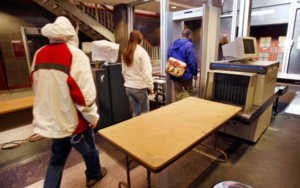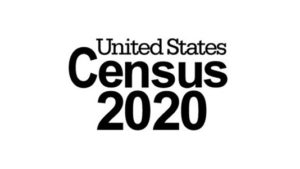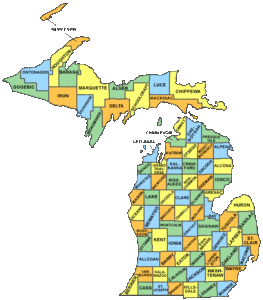MAC members attend Trump speech, make Capitol Hill visits

Attendees of the 2020 NACo Legislative Conference make sure to get their own photos and video of President Donald Trump’s address to the conference on March 3. (Photo by MAC staffer Meghann Keit)
From hearing President Trump discuss federal cooperation with counties, to fanning out across Capitol Hill to meet with Michigan lawmakers, to attending briefings on coronavirus, mental health policies and more, MAC’s contingent of county commissioners and others were kept busy during the 2020 National Association of Counties Legislative Conference last week.
About 50 county leaders from Michigan joined more than 1,500 county officials from across the nation to attend committee sessions and work on key policy issues.
During the conference, MAC leads county officials on visits to Michigan’s members of Congress on Capitol Hill. This year, MAC groups met with or received briefings from Sens. Debbie Stabenow and Gary Peters and Reps. Bill Huizenga, Justin Amash, John Moolenaar, Dan Kildee, Fred Upton, Haley Stevens and Debbie Dingell.
The NACo event each year draws on the local experiences and expertise of commissioners from the 3,069 U.S. counties to craft policy initiatives for Congress and federal regulators. A highlight of this year’s conference was an address by President Donald Trump.
“This was one of our largest contingents to attend NACo Legislative, which helps us in making our case to federal lawmakers on our needs in Michigan,” said Stephan W. Currie, executive director of the Michigan Association of Counties. “And President Trump’s address to the conference is another example of how this administration views the importance of county government.”
House GOP unveils local road funding plan
 The Republican majority in the Michigan House introduced legislation this week to phase out the sales tax on gas and replace it with an excise tax dedicated to local roads.
The Republican majority in the Michigan House introduced legislation this week to phase out the sales tax on gas and replace it with an excise tax dedicated to local roads.
House Bills 5582-88 phase out the sales tax paid at the pump by 2 percentage points per year beginning Oct. 1, 2020, and simultaneously phase in an excise tax at the pump at the same rate. Sixty percent of the approximately $780 million in this annual revenue is slated to be distributed counties and 40 percent to city and village roads.
This move is consistent with the House Republican priorities for road funding, calling for the all the taxes paid at the pump to go to fund our roads. However, this plan leaves a shortfall in the School Aid Fund (SAF) and in constitutional revenue sharing (CRS) for cities, villages and townships. The plan also calls for earmarking the state’s income tax to backfill the hole created in the SAF due to this shift in taxes, yet that will create a different hole in the state’s General Fund.
How the plan will backfill the loss in CRS is yet to be seen.
The House leadership believes there is enough growth in the coming years and enough budget cuts that can be made to make up for this loss in General Fund. However, MAC remains skeptical of this claim and has not taken a position on the bills.
For more information on this issue, contact Deena Bosworth at bosworth@micounties.org.
Weapon-related infringement on local control advances in House
 A bill to bar local governments from engaging in publicly financed gun buyback programs sped through the House this week, despite opposition from MAC and others over the clear infringement on local control.
A bill to bar local governments from engaging in publicly financed gun buyback programs sped through the House this week, despite opposition from MAC and others over the clear infringement on local control.
House Bill 5479, by Rep. Annette Glenn (R-Midland), cleared committee and the full House in just two days. It would prohibit a local unit of government, including counties, from using any public resource to implement, administer or operate a program to purchase privately owned firearms, firearm parts or ammunition from private individuals or organizations. MAC opposed the bill as an infringement on local control and county funds. The bill passed committee on a party-line vote without the typical two weeks of testimony and was approved by the House a day later 58-49. The bill was sent to Senate Government Operations, which is known to either pass bills very rapidly or never move them.
Another bill to curtail local control, House Bill 5286, by Rep. Steve Johnson (R-Kent), was heard by the House Judiciary Committee this week, but no action was taken this week. It would create the Michigan Knife Rights Act and prohibit local governments from enacting ordinances relating to knives that are more restrictive than state law. MAC also opposed HB 5286, as counties should have authority to regulate their county-owned buildings.
According to legal advice obtained by MAC, it is not clear whether a county rule or policy banning or regulating the carrying of knives on county property, as opposed to banning or regulating it anywhere in the county (which Counties cannot do anyway), would necessarily be “more restrictive than state law.“
MAC has suggested changes to address this uncertainty as it relates to county-owned property. HB 5286 is expected to get a vote next Tuesday, but it is uncertain that bill leaders will accept MAC’s recommendations.
For more information on this issue, contact Meghann Keit at keit@micounties.org.
MDHHS: State increasing coronavirus testing
 As cases of coronavirus disease (COVID-19) increase in the United States and internationally, the Michigan Department of Health and Human Services (MDHHS) Bureau of Laboratories has increased its testing supplies to test more than 300 Michiganders for the virus, more than doubling its previous testing capacity.
As cases of coronavirus disease (COVID-19) increase in the United States and internationally, the Michigan Department of Health and Human Services (MDHHS) Bureau of Laboratories has increased its testing supplies to test more than 300 Michiganders for the virus, more than doubling its previous testing capacity.
The MDHHS lab received additional test kits from the Centers for Disease Control and Prevention (CDC) Thursday. The kits are currently undergoing a validation process but should be ready for use by the end of the week.
“We want Michiganders to know that their state laboratory is ready and able to provide testing for COVID-19,” said Dr. Joneigh Khaldun, chief medical executive and chief deputy for health at MDHHS. “We are currently able to provide same day turnaround for test results.”
The new test kits arrived following news from the CDC that testing criteria had expanded to include any persons, including health care workers, who have had close contact with a laboratory-confirmed COVID-19 patient within 14 days of symptom onset, or a history of travel to one of the affected geographic areas within 14 days of symptom onset. Affected areas include China, Iran, Italy, Japan and South Korea.
To date, there are no confirmed COVID-19 cases in Michigan. As of March 4, eight people have been tested for COVID-19 in the state: five by CDC and three by MDHHS.
This is a rapidly evolving situation. For the latest information, visit Michigan.gov/coronavirus or CDC.gov/coronavirus.
Census estimate: State at risk of missing more than 1 million residents
 As much as 10 percent of Michigan’s population are at risk of not being counted in the 2020 Census, says a new report, jeopardizing huge amounts of federal funds for the state.
As much as 10 percent of Michigan’s population are at risk of not being counted in the 2020 Census, says a new report, jeopardizing huge amounts of federal funds for the state.
As the once-a-decade population count gets under way, a coalition of nonprofits, local government associations (including MAC), labor unions, religious groups, business stakeholders and more held a press conference last week to announce the “Be Counted” campaign to promote an accurate count for Michigan.
The press conference highlighted an analysis that found 10 counties (Wayne, Oakland, Macomb, Kent, Genesee, Washtenaw, Ingham, Kalamazoo, Ottawa and Saginaw) are at risk of missing by about 1.2 million people in the counts. See the breakdown here. Historically, young people, the homeless, veterans, renters and immigrants are the hardest populations to count and make up the most undercounted segments of society.
In 2010, the last census, the response rate was only 78 percent; the goal for the 2020 Be Counted campaign is 82 percent, which would mean tens or even hundreds of millions of dollars in additional funds flowing into local communities.
MAC strongly urges full participation and support for the U.S. Census efforts across Michigan. Opportunities to fill out a census form will be made online, with door-to-door canvassers, at townhalls across the state and directly in residents’ mailboxes.
For more information on this issue, contact Michael Ruddock at ruddock@micounties.org.
USDA offering grants to boost rural economy
 The U.S. Department of Agriculture’s Rural Development Office is accepting applications for grants to help strengthen the rural economy.
The U.S. Department of Agriculture’s Rural Development Office is accepting applications for grants to help strengthen the rural economy.
The grants are available under the Rural Community Development Initiative program for qualified intermediaries to provide assistance to help improve housing and community facilities, and to implement community and economic development projects in rural areas.
Electronic applications must be submitted to grants.gov by May 13, 2020, at midnight EST. Paper applications must be submitted to the applicant’s USDA Rural Development state office by May 18, 2020, at 4 p.m. local time. Additional information is available on page 12761 of the March 4, 2020, Federal Register.
The USDA encourages applications that will support recommendations made in the Report to the President of the United States from the Task Force on Agriculture and Rural Prosperity to help improve the quality of life in rural America. Applicants are encouraged to consider projects that provide measurable results in helping rural communities build robust and sustainable economies through strategic investments in infrastructure, partnerships and innovation. Key strategies include:
- Achieving e-Connectivity for Rural America
- Developing the Rural Economy
- Harnessing Technological Innovation
- Supporting a Rural Workforce
- Improving Quality of Life
USDA also encourages applications that will support the administration’s goal to combat substance use disorder, including opioid misuse, in high-risk rural communities by strengthening the capacity to address prevention, treatment and/or recovery.
The USDA will be one of nearly 40 entities at the 2020 Legislative Conference Exhibitor Show in April. Have you registered to attend?
 National news from NACo
National news from NACo
- President Trump addresses NACo General Session
- HUD secretary talks cutting regulations to create affordable housing
- NACo members get briefing on coronavirus from CDC
- Chinese restrictions bring changes to county recycling
